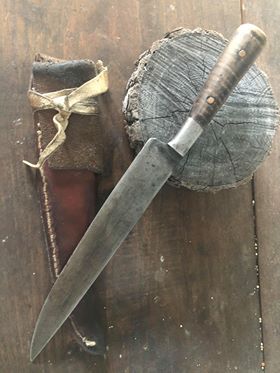Making knives and history with Chris Fultz
Published 2:05 pm Wednesday, July 29, 2020
|
Getting your Trinity Audio player ready...
|
Chris Fultz is a teacher, a reenactment actor and a blacksmith. His knives are getting the attention of hunters and historians alike. Fultz is married to Ashley and they have two kids Madeline and Noah. The Fultz family currently resides in Harrogate, Tennessee.
As a history teacher at Claiborne High School, Fultz was able to teach his students the struggles of the people settling in the area. He stressed to them that life was different back then and taught his students this important lesson, “When you needed something back then you made it and if it broke, you fixed it.”
Fultz learned the basics of smithing through volunteering at the Wilderness Road State Park, Martin’s Station reenactments all due to an invite from fellow historian and teacher Richard Beeler, “I was invited to take part in the reenactment and I was just hanging around not really doing anything and saw Master smith Billy Heck working on a forge. I asked him to show me how to do it and he allowed me to help. I can say I have learned countless things from him about blacksmithing.”
Admittedly, Fultz has a lot more to learn about smithing but he quickly caught on to the basics and now makes historically accurate knives. He takes his time creating his works of primitive art and explains his process in this manner, “A customer will come to me with an idea on a knife and I will research it for time period, style and type of materials used all with the goal of being historically accurate.”
Fultz continued to talk about the knives settlers used, “Every single man during the time period carried a knife with a blade size of five to 10 inches on their side not including the handle. Often, they carried up to three knives for the various different daily chores they encountered.”
Fultz re-purposes truck springs primarily for his recreations because of the carbon content, “Sure, I could use the newer alloys and combination steels in my blades but I prefer not to do the modern type blades. They simply don’t hold an edge like old carbon steel.”
There is another aspect of forging that Fultz wants everyone to see, “So many life lessons are taught by being around the forge. Just as in life not all things are successful; sometimes there are failures. I keep the ones that fail so I can learn a lesson from it. We have lost that side of craftsmanship in what is made today.”
Fultz now teaches history at Cumberland Gap High School and now has a different way of appealing to his class, “When I take my knowledge of blacksmithing to our class now I am finding it lends credibility to what I do in the classroom. I think it’s becomes more relatable to them.”
He is constantly being bombarded with questions about why he doesn’t teach blacksmithing or forge full time and he always gives this type of reply, “There’s nothing I like better than being at the forge at Martin’s Station or my home; however, I don’t necessarily want to do it for a living. That three letter word (job) might ruin the fun of it for me.”
Fultz currently does several “friendship” type sales and is interested in making knives for others but be aware his turnaround takes longer due to the complex nature of his historically accurate knives. He doesn’t advertise but says this, “I am open to making knives for people but I’d rather produce a blade of my choice and put it out there for someone to see and possibly purchase.”
Chris Fultz is a history teacher that students can relate to because he physically does some of what he teaches. He is at home on a forge making knives, tools, hinges or even nails. His goal is to simply keep the historical ways of producing items alive and he does it well.
By: Allen Earl
allen.earl@claiborneprogress.net
(Photo submitted by family)




